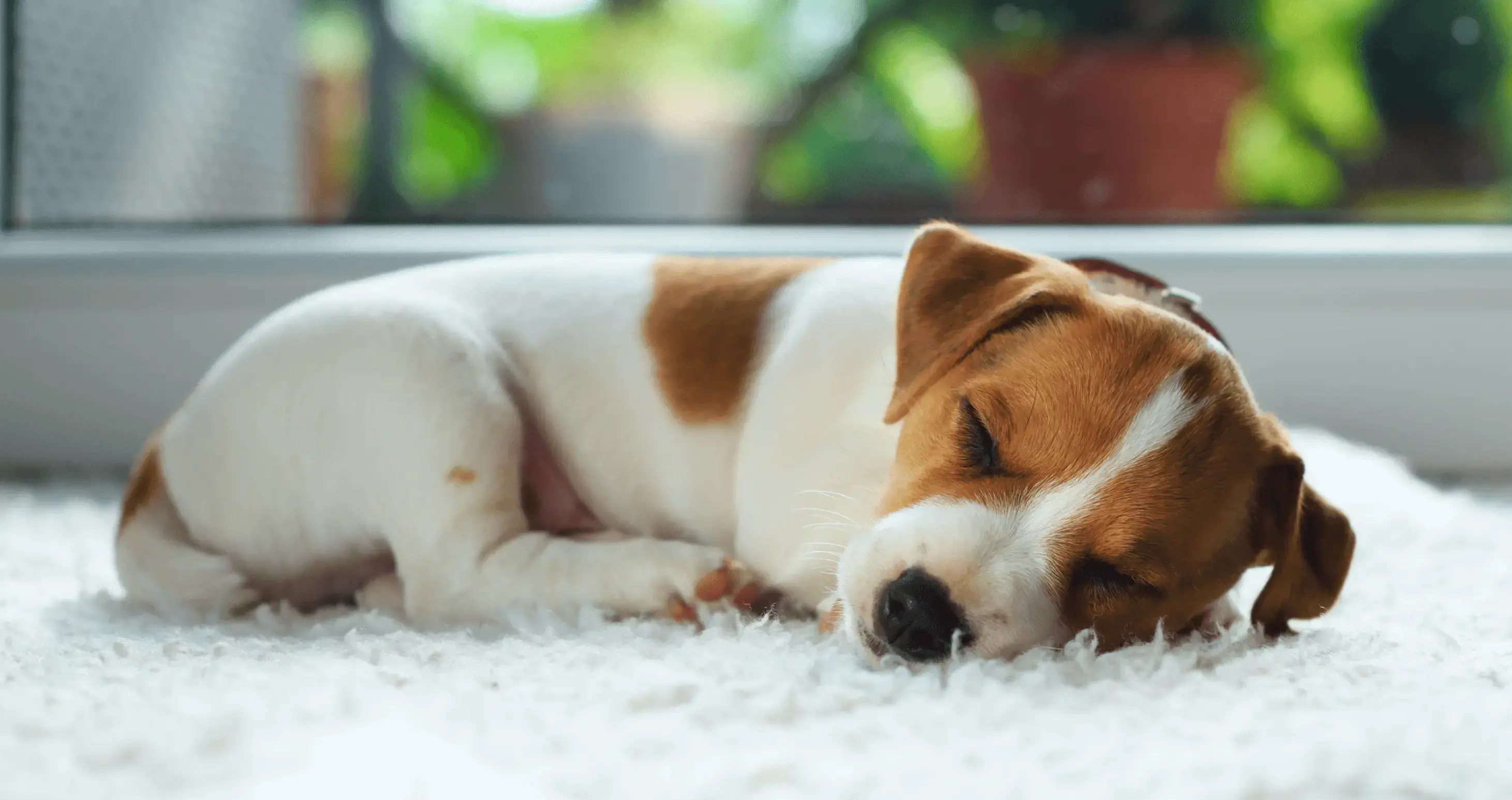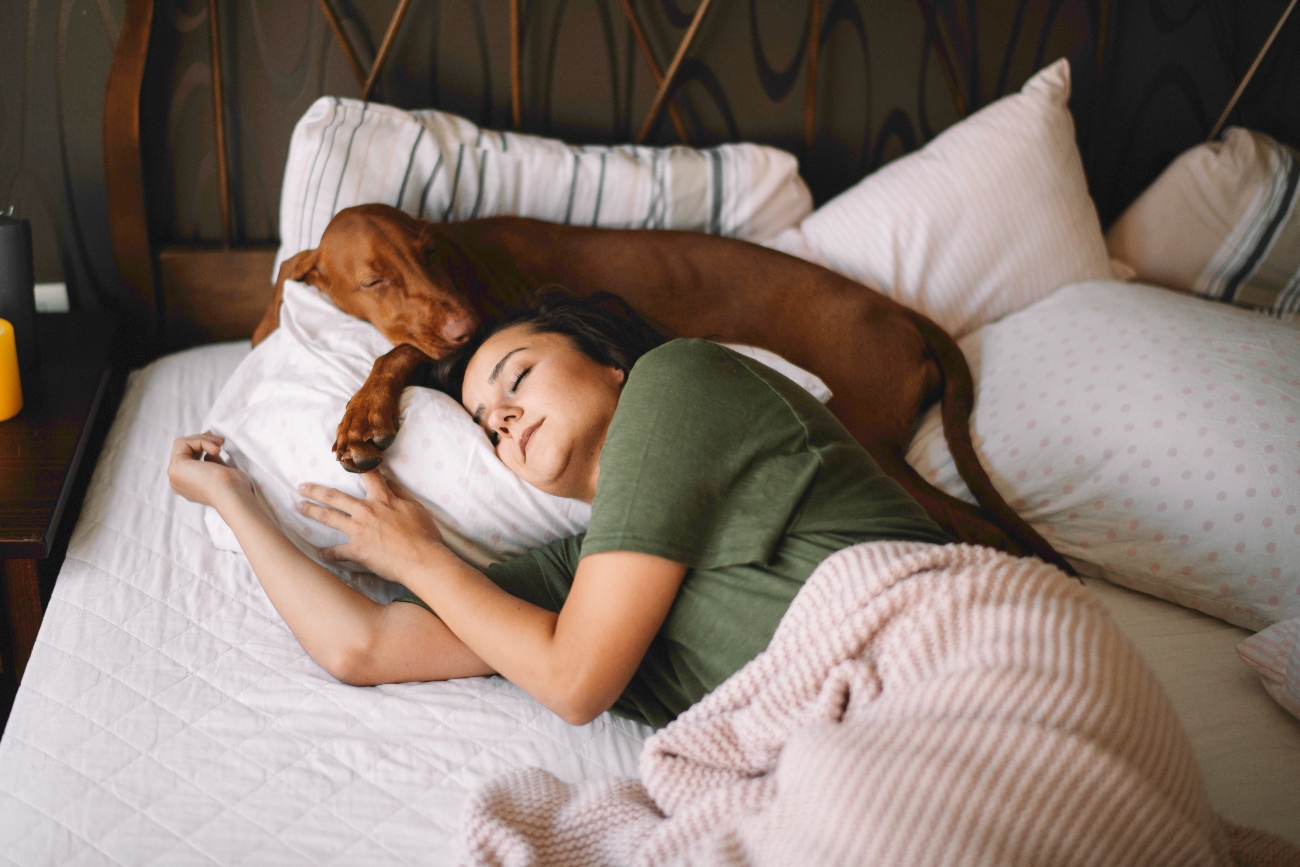How much should my dog sleep?
2nd February, 2024

The life of many dogs may seem quite relaxed and leisurely, especially considering the number of hours they spend dozing off. Puppies sleep a lot, up to 18 hours per day! Adult dogs, particularly active breeds, require an average of 14 hours of sleep per day. As your dog gets older, they will likely start to sleep more during the daylight hours.
This comprehensive guide is designed to answer these questions and more, helping you understand your dog's sleep patterns and needs. Let's dive in!
Understanding your dog's sleep needs
Unlike humans, dogs don't sleep for one long stretch at night. They spread their sleep throughout the day and night, intermittently napping and waking.
On average, an adult dog sleeps about 12-14 hours a day, while puppies and older dogs may sleep even more. Their ancestral genetic coding instructs them to conserve energy and sleep more when not engaged in activities such as hunting, playing, or socialising.
Factors influencing your dog's sleep
Several factors can influence how much a dog sleeps. These include, but are not limited to:
- Age: Puppies and older dogs typically require more sleep than middle-aged dogs. Puppies expend a lot of energy exploring their environment and learning new things, necessitating more sleep for growth and development. Similarly, older dogs need more rest to recover from daily activities.
- Breed and size: Certain breeds are more prone to sleep than others. Larger breeds usually sleep more than smaller ones.
- Health and diet: A dog's general health and diet can significantly influence their sleep. Dogs with health conditions may sleep more than healthy dogs. Similarly, a change in diet can affect your dog's normal sleeping pattern.
- Activity levels: Active dogs may sleep less than inactive ones. If a dog is engaged in activities and exercises regularly, they may require less sleep.
Sleeping patterns of dogs
Dogs have different types of rest periods throughout the day. On average, a dog's day comprises about 50% deep, restorative sleep, while another 30% is more of a light snooze.
During their deep sleep stages, you may notice your dog's eyes twitching or their paws flicking. Just like humans experience REM (Rapid Eye Movement) sleep, dogs also have a similar dreaming stage. This is when they process their day's experiences, perhaps dreaming about chasing squirrels or playing fetch.
Sleep behaviour and positions
Dog sleeping patterns include a variety of often hilarious sleeping positions. They might curl up into a ball, sprawl out on their side or even sleep on their back with their paws in the air. These positions can depend on their breed, their surroundings, and their sense of safety.
Before settling down to sleep, dogs often exhibit behaviours such as circling or digging. This behaviour is a throwback to their wild ancestors who used to create dens for sleeping.
Where should dogs sleep?
Providing a designated sleeping area for your dog, such as a pet's dog bed, is essential for their well being and supports your dog's routine. It provides them with a space of their own where they can retreat if they want some 'me time'. For older dogs, consider investing in a thicker, more comfortable bed to provide support for their ageing bones.
It has also been understood that having dogs sleep in your room can even help improve your own sleeping habits.
Sleep troubles in dogs
Just like humans, a dog’s sleep can also experience troubles. If your dog's sleep habits seem to change suddenly, or if they are hard to wake up, it may be a sign of an underlying health issue.
Common sleep problems
A few common sleep problems in dogs include:
- Change in diet: Some foods may be harder for your dog to digest than others, which can disrupt their sleep.
- Pain: Restlessness can indicate that your dog is in pain. Many senior dogs experience arthritis, which can make settling down to sleep difficult.
- Underlying health conditions: Conditions such as thyroid problems, heart disease and diabetes can cause lethargy and a decreased inclination to exercise.
- Doggy dementia: In older dogs, cognitive dysfunction syndrome (CDS), also known as doggy dementia, may result in dog's sleep schedule being disturbed.
If you notice a significant change in your dog's normal sleep patterns, it's always wise to consult with a vet.
Do older dogs sleeping habits differ from puppies?

If you've spent time with puppies and an adult dog, you may have noticed that their sleeping patterns are not quite the same.
Puppies sleep to aid in their growth and development. They can sleep for up to 20 hours a day, which includes both night time rest and daytime naps. Many puppies are often full of energy in short bursts, but tire out quickly and need frequent periods of rest. Their sleep is vital for their growth, learning and exploration of the world around them.
On the other hand, senior dogs tend to sleep more than their younger counterparts but in a different pattern. As dogs age, they begin to slow down. They may not have the same energy levels as they did when they were puppies or young adults.
This decrease in activity often leads to increased sleep during the day and night, totalling around 14 hours on average. However, the sleep of adult dogs tends not to be as deep as that of puppies. They may wake up more frequently during the night due to discomfort from arthritis or other health issues.
While both puppies and senior dogs require plenty of sleep, their patterns and reasons behind those patterns vary significantly. Sleep plays an essential role at every stage of a dog's life, from the growth-focused sleep of puppies to the rest-and-recover sleep of adult dogs. Understanding this can help us better accommodate our furry friends' needs as they move through different stages of life.
How much sleep does a puppy need?
Puppies are like little balls of energy one minute, and the next, they are completely zonked out. Puppies require more sleep than adult dogs due to the physical and mental growth that occurs during sleep. On average, a puppy might sleep for about up to 20 hours a day.
In the early days, establishing a sleep routine can be a challenge for both the puppy and the owner. It's essential to create a comfortable and quiet environment for the puppy to sleep. This will help them understand that it's 'sleep time'.
Consult a vet if you have sleep concerns
If your dog's sleeping patterns change drastically, it's crucial to consult with a vet. Changes in sleep patterns could indicate underlying health issues that require medical attention.
Remember to keep a sleep log detailing any changes in your dog's sleep patterns to share with your vet. This can help them diagnose any potential health problems accurately.
Ensuring a good night's sleep for your dog
As pet parents, to ensure your dog gets a good night's sleep, consider the following tips:
- Establish a routine: Dogs thrive on routine. Try to keep their bedtime and wake-up time consistent each day.
- Create a calm environment: Make sure your dog's sleeping area is quiet, comfortable and free from disturbances. This will help avoid putting additional stress on your dog.
- Keep them active during the day: Regular exercise will help your dog fall asleep at night.
- Eating patterns and diet: Ensure your dog is eating a balanced diet that is easily digestible. If you notice any changes in their sleep after a diet change, consult with a vet.
Remember, every dog is unique, and what works for one might not work for another. If you're struggling with your dog's sleep, don't hesitate to seek professional advice.
My dog is snoring loudly, what does this mean?
Just like most dog parents, many dogs can snore too. Occasional snoring may not be a cause for concern. However, if your dog is sleeping and snoring is frequent and loud, it could be a sign of an underlying health issue such as obesity, allergies, or respiratory issues.
Hence, if your dog's snores are shaking the room and interrupting your sleep, it might be time to pay a visit to your vet. After all, we all want our furry friends to be in the pink of health!
Insuring your dog for peace of mind
In some cases, changes in your dog's sleep pattern could be a sign of underlying health issues. Regular vet check-ups can help you stay on top of your dog's health.
To ensure you're prepared for unexpected health concerns, consider getting dog insurance for your furry friend. You can get a quote through our website. If you'd like to talk to one of our dog insurance specialists, you can get in touch with us on 0330 102 5748.
Conclusion
Understanding your dog's sleep patterns can help you ensure they're getting the right amount of rest they need. It's essential to keep an eye on any changes in your dog's sleeping behaviour and consult a vet if necessary. Remember, a well-rested dog is a happy and healthy dog.
Please note: While we aim to provide accurate information, this article is meant as a general guide only and is not a substitute for professional veterinary advice.
Helpful Pages
Recent Posts
Pet Insurance Quote
- 98% claims paid *
- Claims paid directly to vets
- 24/7 vet video consultations
- Interest free monthly payments




